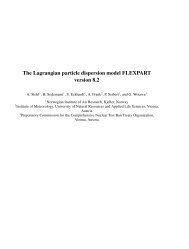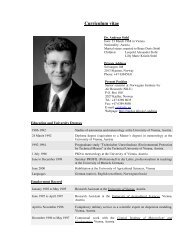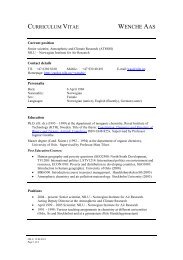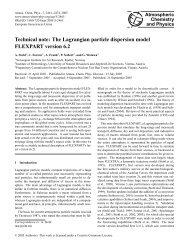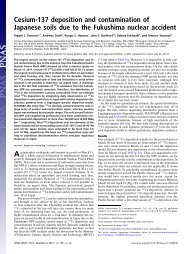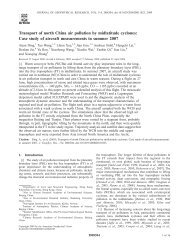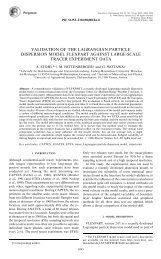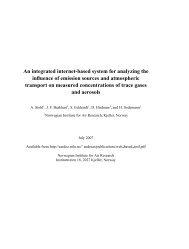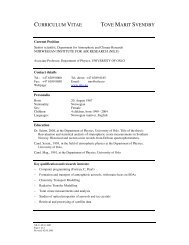Clean Up Your English - NILU
Clean Up Your English - NILU
Clean Up Your English - NILU
You also want an ePaper? Increase the reach of your titles
YUMPU automatically turns print PDFs into web optimized ePapers that Google loves.
Editorial<br />
Editorial: Language Pollution<br />
<strong>Clean</strong> <strong>Up</strong> <strong>Your</strong> <strong>English</strong><br />
Avoiding Superfluous Words in Scientific Reporting<br />
1 Introduction<br />
Dmitry N. Tychinin *<br />
Institute of Biochemistry and Physiology of Plants and<br />
Microorganisms, Russian Academy of Sciences,<br />
13 Prospekt Entuziastov, Saratov 410015, Russia;<br />
e-mail: ra4cft@ibppm.saratov.su<br />
Scientists' need for an adequate command of <strong>English</strong> has probably<br />
never been greater. The worldwide acceptance of <strong>English</strong><br />
as the primary language of publication dictates that if we want<br />
to make our voices heard by the international research community,<br />
we must write <strong>English</strong>. But if we want our message to<br />
be understood as intended and our results to be estimated at<br />
their true worth, we must learn to write good <strong>English</strong> – that<br />
'which gives the sense in the fewest short words' [1].<br />
Much of the European research output is now published in<br />
<strong>English</strong>, both in international journals and as translations of<br />
papers published simultaneously in other languages. As a science<br />
translator and editor, I notice that even accepted papers<br />
sometimes suffer from linguistic deficiencies, and many are returned<br />
to the authors for language improvement before scientific<br />
review. The reason is not so much bad grammar as bad<br />
style. Some typical referees' comments:<br />
• The difficulty I had in reading this manuscript does not stem<br />
from the authors' imperfect grasp of <strong>English</strong>. Indeed, their<br />
<strong>English</strong> is generally good. What they lack is not a mastery<br />
of <strong>English</strong>, but the ability to convey their ideas as simply<br />
and directly as possible.<br />
• The paper is generally written in a language that is understandable<br />
but would benefit from some rewriting in places.<br />
• Although the <strong>English</strong> in the manuscript is generally adequate,<br />
the use of inappropriate words makes the text confusing.<br />
The key characteristic of scientific writing is clarity [1]. A technical<br />
report must contain as few words as necessary for readers<br />
to comprehend it. When authors use more words, they usually<br />
*Dmitry N. Tychinin was born in Saratov, Russia, in 1970. He studied in the<br />
Philology Faculty at N.G. Chernyshevsky Saratov State University, graduating<br />
in 1992 with the Diploma degree with specialisation in <strong>English</strong> Language<br />
and Literature. Since 1992, he has been with the Russian Academy<br />
of Sciences’ Institute of Biochemistry and Physiology of Plants and<br />
Microorganisms, Saratov, where he has taught <strong>English</strong> courses for 2 years.<br />
He is now leading translator at the institute’s Scientific and Technical Information<br />
Unit. He has 21 translations published, including 19 refereedjournal<br />
articles and 2 book contributions. His interests are in the craft of<br />
scientific writing and editing.<br />
ESPR – Environ Sci & Pollut Res 8 (4) 227 – 229 (2001)<br />
© ecomed publishers, D-86899 Landsberg, Germany and Ft. Worth/TX, USA • Tokyo, Japan Mumbai, India Seoul, Korea<br />
Language Pollution<br />
sacrifice clarity. They are not entirely to blame, of course. The<br />
second-language-teaching practice is still very much directed<br />
towards helping specialists to acquire mostly a reading and<br />
speaking knowledge of <strong>English</strong>. Few institutions of higher learning<br />
in Europe [2] and very few in Russia offer academic-writing<br />
courses. As a result, scientists are often unable to express<br />
themselves simply and neatly in written <strong>English</strong>. When developing<br />
a paper, they rely on bilingual dictionaries, which contain<br />
no usage or style notes. They translate word by word what<br />
they think in the native language and leave it at that. No wonder<br />
such manuscripts tend to be verbose and hard to follow.<br />
For a true environmentalist, writing-style improvement is not a<br />
matter of choice at will; it is part of his or her green thinking. As<br />
Rudolf Flesch [3] puts it, 'In this age of general pollution, clear,<br />
simple language is just as important as clean air, land, and water'.<br />
In this brief note, I adopt Flesch's eco-oriented approach to present<br />
my thoughts on how to eliminate superfluous words in our reporting.<br />
These words are so numerous that they make papers<br />
breathe heavily, so volatile that no manuscript seems to remain<br />
unaffected by them, so persistent that they hamper (or even prohibit)<br />
the appreciation of our results. Extensive lists of these 'waste'<br />
[1] or 'plague' [4] words are available in books [1,5] and over the<br />
Internet (e.g. [4,6]). Here, I list and discuss more such words and<br />
phrases, taken from my own collection.<br />
2 Green-Writing Tips: Assuming an assumption<br />
Distinguishing features of scientific <strong>English</strong> are politeness and<br />
the avoidance of strong knowledge claims [7]. In trying to sound<br />
non-aggressive, we, non-native speakers, sometimes go too far.<br />
To quote O'Connor and Woodford [5]:<br />
Beware of hedging over uncertainties or suppositions: 'It may<br />
seem reasonable to suggest that necrotic effects may possibly<br />
be due to involvement of some toxin-like substances' contains<br />
eight degrees of uncertainty and only means 'Necrosis may be<br />
due to toxins'.<br />
The following sentence does not contain eight degrees of uncertainty.<br />
But it has two: 'We assume that these elements possibly<br />
consist of raw ore dust'.<br />
227
Language Pollution<br />
Let us think a moment. The sentence says 'possibly', which labels<br />
it clearly as an assumption. Consequently, is there a need<br />
to assume an assumption? Let us make it either These elements<br />
possibly consist of raw ore dust or We assume that these elements<br />
consist of raw ore dust.<br />
Similarly, 'We assume that these elements may consist of raw<br />
ore dust' makes us sound a bit more timid than we want to.<br />
Here, a choice should be made between 'We assume' and 'may'.<br />
One degree of uncertainty is enough.<br />
By means of<br />
The three-word variant of 'by', 'with', or 'through' is particularly<br />
unfit for titles, which, as Day [1] reminds us, should contain<br />
only words useful for indexing purposes. Therefore, Determination<br />
of Arsenic in Soils by Gas Chromatography is more<br />
acceptable than 'Determination of Arsenic in Soils by Means of<br />
Gas Chromatography'.<br />
Currently<br />
It is better to substitute currently for now, especially in sentences<br />
that have their main verbs in the Present Continuous tense: We<br />
are now analysing a number of other mutants in vitro. With now,<br />
we will jump easily over the beginning to what we are after (that<br />
is, the message). But it may be even better to use nothing at all:<br />
We are analysing a number of other mutants in vitro.<br />
The use of currently is strongly discouraged with the verb 'continue'<br />
and with words and expressions that indicate per se the<br />
currentness of the moment: Experiments are under way/in<br />
progress/ongoing/continuing to investigate these possibilities.<br />
The molecular events triggering these physiological and biochemical<br />
adjustments are under investigation.<br />
Effective writing vs. writing for effect<br />
Let me quote from a referee's evaluation sheet: 'Effect is one of<br />
the most overused words in science. It conveys almost no information,<br />
since everything is some kind of an effect'. I keep in<br />
mind that referee's comment each time I start working on a<br />
text. A 'necrotic effect' is necrosis; an 'adverse effect', strictly<br />
speaking, should be explained; and the sentence, 'This gives<br />
rise to the effect of synchronisation', may sound like an abbreviated<br />
thought about synchronisation effects on something else.<br />
Constructions such as 'to have a stimulatory effect', 'to have a<br />
deleterious effect', 'to have a protective effect', etc. can be<br />
changed to simpler <strong>English</strong>:<br />
to have an adverse effect on – to be adverse to<br />
to have a beneficial effect on – to be beneficial for/to<br />
to have a deleterious effect on – to be deleterious to<br />
to have a fatal effect on – to be fatal to<br />
to have a harmful effect on – to be harmful to<br />
to have an inhibitory effect on – to be inhibitory to, to inhibit<br />
to have a protective effect on – to be protective of/towards,<br />
to protect<br />
to have a retarding effect on – to retard<br />
to have a stimulating/stimulatory effect on – to be stimulatory<br />
to, to stimulate<br />
Titles beginning with '(The) Effect of...' have a history of use but<br />
seem to no longer be in fashion. Today's referees feel increasingly<br />
negative towards them. The reason is simple: A title, according<br />
to Day [1], is defined as the fewest possible words that highlight<br />
Editorial<br />
the significant content of the paper. An effect title is too general<br />
and does not tell readers even the absolute minimum of what<br />
'effect' (inhibitory? stimulatory?) authors have in mind.<br />
Essentially, virtually<br />
It is safe to substitute the words for almost in this type of sentence:<br />
'Essentially/Virtually no information is available on the<br />
effects of ammonia and phosphate on biosludge settleability'.<br />
Nature<br />
'Material of a protein nature' is not especially revealing. Whether<br />
the material in question is fully protein should be stated clearly.<br />
As the ESPR Instructions for Authors put it, 'Restrict to hard<br />
facts'!<br />
Sticklers for nature, here is a quick grammar tip: When the word<br />
is modified by a noun functioning as an adjective, the indefinite<br />
article is obligatory: of a carbohydrate nature. I have seen the<br />
article omitted, but I know this to be unidiomatic <strong>English</strong>.<br />
Phase, stage, step<br />
These can also be 'waste' words. For example, we often write:<br />
'The first/next step of our work was to measure... (say, As concentrations<br />
in soils)'.<br />
Look at the fragment in italics. Its only role is to introduce the<br />
second part of the sentence, carrying the message ('measure As<br />
concentrations in soils'). But its length (seven words plus the<br />
definite article) does more to tire than to interest readers. Let<br />
us switch to plain, active <strong>English</strong>: We first/next measured As<br />
concentrations in soils. Sounds better.<br />
Here are similar cases. Look to the left and then to the right.<br />
Same meaning, less space!<br />
at the early stages of – early in<br />
it is an essential phase in – it is essential for<br />
So-called<br />
Most dictionaries make no distinction between so-called (with a<br />
hyphen) and so called (without a hyphen). Fortunately, there are<br />
exceptions. The Shorter Oxford <strong>English</strong> Dictionary on Historical<br />
Principles, for example, has this to say:<br />
so-called 1. In predic. use (prop. without hyphen): Called or<br />
designated by that name. 2. In attrib. use (hyphened): Called<br />
or designated by this name or term, but not properly entitled<br />
to it or correctly described by it [8].<br />
The non-hyphened so called with its 'neutral' meaning is perfectly<br />
acceptable in a research manuscript: The reaction mass<br />
(RM) is so called because it is a complex mixture of the endproducts<br />
of detoxification reactions. Not so with its hyphened<br />
version: it implies that something is not worthy of its name.<br />
'The so-called flushing bioreactor' sounds as if you were critical<br />
about the poor reactor to the point of contempt, which is<br />
surely not what you have in mind.<br />
If you are just in doubt whether the term you are referring to is<br />
commonly accepted in the literature and wish to express that<br />
thought, here are possible ways out:<br />
Use quotation marks (which will indicate that '...you as writer<br />
are not responsible for this form of words' [9]): Clones that<br />
appeared to be 'cured' were screened for plasmid content.<br />
228 ESPR – Environ Sci & Pollut Res 8 (4) 2001
Editorial<br />
Use quotation marks and insert a reference: The next step is<br />
the formation of the 'true inducer' from cellodextrins (Jones<br />
2000). Or include an explanatory remark: At some point these<br />
maternally supplied products are supplemented by transcription<br />
from the embryo's own genome (the 'nuclear substance'<br />
in Boveri's formulation).<br />
Use 'neutral' phrases like what is called, what is termed/known<br />
as, or as it is called: In this way, we obtain what is called a<br />
frequency curve. These are usually called 'jackpots'.<br />
So-called is more characteristic of colloquial than written speech.<br />
Sometimes it seems to be used merely for the sake of a colloquial<br />
touch, as in 'This means that a so-called "coarse grained"<br />
(i.e. lower resolution) picture is sought'. But here, again, if you<br />
enclose a term in quotation marks (and even explain it there<br />
and then), you never need so-called. Combining so-called with<br />
quotes is not permissible.<br />
Tautology: Will you repeat it again?<br />
A major group of language pollutants is formed by tautologies<br />
– the needless saying of the same idea, usually in different words.<br />
A useful list of the common tautologies found in general writing<br />
is available electronically [6]. Following are some examples<br />
from science literature:<br />
'A surprising and unexpected result': An unexpected result<br />
will emphasise the unexpectedness while eliminating the<br />
redundancy of the synonym 'surprising'.<br />
'Buffer solution': Someone has been clever at solving his or<br />
her problems with a chemical buffer. That is what 'buffer<br />
solution' may suggest. If this is not the intended meaning,<br />
we should use buffer alone.<br />
'Contain/include something as part of one's structure': The<br />
second portion of this fragment is unlikely to add much to<br />
a sentence. To contain is 'to have in it' and to include is 'to<br />
contain as a constituent part of a whole' [8]. Either of the<br />
verbs used alone will do.<br />
'Demonstration example': An example is demonstrative by<br />
definition.<br />
'For a full and complete Guide to Authors please refer to...':<br />
Even journal editors do not follow their own recommendations<br />
sometimes. I wonder whether one has ever seen a full<br />
and incomplete Guide to Authors.<br />
'Future outlook': Outlook is 'the prospect for the future'<br />
[8] by definition. Hence, Conclusions and Outlook, not<br />
'Conclusions and Future Outlook'.<br />
'HPLC chromatography': 1. Spell the abbreviation out, and<br />
you will spot the error: 'high-performance liquid chromatography<br />
chromatography'. 2. Repeat step 1 when you have<br />
doubts about 'GC-MS spectrometry', 'SDS-PAGE electrophoresis',<br />
etc.<br />
'The cleaning solution increases the cleaning capability of a<br />
corresponding cleaning process...': No comment needed.<br />
Tool: Render it unto the workman<br />
Many of us are not engaged in manual work, and none wear<br />
aprons or overalls. Yet, we call each other workers and have<br />
'tools'. In scientist hands, almost anything becomes a 'tool':<br />
plants, bacteria, enzymes, even antibodies. Well, in the sense of<br />
'a means of effecting something; an instrument' [8], the word<br />
has long ago become an empty cliché used at every step, making<br />
the writing stale. Let us not forget that tool is still strongly<br />
suggestive of 'a mechanical implement for working upon something,<br />
as by cutting, striking, rubbing, or other process, in any<br />
Language Pollution<br />
manual art or industry; usu., one held in and operated directly<br />
by the hand, but including also certain simple machines, as the<br />
lathe' [8]. Whereas trees and grasses are often called 'remediation<br />
tools', they are really not much of a tool. You may say this is<br />
literalism, but is devaluation of the word any better?<br />
Toxic<br />
I am very fond of this editorial comment – I think anyone writing<br />
for an ecology journal should keep it in mind:<br />
Avoid the use of unqualified emotive terms such as 'toxic'<br />
when describing biological activity; they should be replaced<br />
with 'active', 'fungitoxic', 'phytotoxic', 'insecticidal', 'insect<br />
toxic', etc., accurately reflecting the content of use.<br />
Suppose we report, 'We used a buffer to wash the bacterial<br />
cells', or call a manuscript 'The Use of Plants To Remediate<br />
Contaminated Soils' – will that be OK with our referees? I<br />
daresay no. Plain as it may seem, there are people who keep<br />
writing this way paper after paper. Editors are resilient, however<br />
– and they must be: if you are a scientist, be precise.<br />
With which<br />
It is verbose to write: 'Such isolates provide excellent model systems<br />
with which to study virus-phytoplankton interactions'. Leave<br />
the 'with which' out; the sentence will make perfectly good sense!<br />
3 Better <strong>English</strong> Next Time!<br />
I hope that the above notes will be of some help to non-<strong>English</strong>speaking<br />
scientists who write, translate, or edit research papers<br />
in the <strong>English</strong> language. I am open to e-mail discussions of <strong>English</strong><br />
use and misuse in scientific reporting. If you have your own<br />
'pet hates', unfit for the language of science, please share them<br />
with me. <strong>Your</strong> feedback would be very much appreciated!<br />
Acknowledgements. It is a pleasure to thank Kevin Bruhn, Jeffrey<br />
Bryson, Chris Hamann, Fred Hutson, George Johnson, Rich Turner,<br />
Richard Vipond, and Vera Webb for many discussions and expert comments<br />
on <strong>English</strong> style and usage. Thanks are also due to Paul Kosterin<br />
of this institute for his encouragement and help.<br />
References<br />
[1] Day RA (1998): How To Write and Publish a Scientific Paper, 5th ed.<br />
Oryx Press, Phoenix, Ariz<br />
[2] Luttikhuizen F (1996): The ins and outs of scientific writing.<br />
Microbiología SEM 12, 477–480<br />
[3] Flesch R (1972): Say What You Mean. Harper and Row, New York<br />
[4] Darling C (2000): Plague words and phrases. Guide to Grammar and<br />
Writing. Retrieved July 30th, 2001, from the World Wide Web: http://<br />
webster.commnet.edu/grammar/plague/htm<br />
[5] O'Connor M, Woodford FP (1975): Writing Scientific Papers in <strong>English</strong>:<br />
An ELSE-Ciba Foundation Guide for Authors. Associated Scientific<br />
Publishers, Amsterdam<br />
[6] Mann M (2000): Deadwood phrases. Authors Guide. Retrieved July<br />
30th, 2001, from the World Wide Web: http://www.pnl.gov/ag/usage/<br />
deadwood.html<br />
[7] Corbett J (1992): Encoding Nature: Writing science in <strong>English</strong>. FEMS<br />
Microbiol Lett 100, 39–44<br />
[8] Little W, Fowler HW, Coulson J (1977): The Shorter Oxford <strong>English</strong><br />
Dictionary on Historical Principles, 3rd ed. Oxford University Press,<br />
Oxford<br />
[9] Greenbaum S, Whitcut J (1990): Longman Guide to <strong>English</strong> Usage,<br />
Spec. ed. Russky Yazyk Publishers, Moscow<br />
ESPR – Environ Sci & Pollut Res 8 (4) 2001 229



